Ministry of Health and Family Welfare
Union MoS for Health and Family Welfare, Smt. Anupriya Patel delivers Keynote Address at the 2nd DHR-ICMR Health Research Excellence Summit 2025
Over the past decade, India has emerged as a major player in health research. Initiatives such as MedTech Mitra and innovations like Rotavac and the COVID-19 vaccines stand as testament to India’s growing prominence in the global health research landscape: Smt. Patel
Dr V K Paul outlines vision to raise India’s Healthy Life Expectancy to 75 years under Viksit Bharat Mission
प्रविष्टि तिथि:
13 NOV 2025 4:11PM by PIB Delhi
Union Minister of State for Health and Family Welfare, Smt. Anupriya Singh Patel, delivered the keynote address at the 2nd DHR-ICMR Health Research Excellence Summit 2025 held here today. Dr. V K Paul, Member (Health), NITI Aayog, was also present on the occasion.
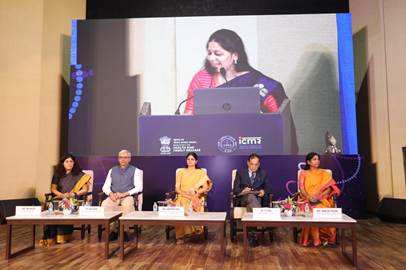
Speaking at the event, Smt. Patel highlighted that India’s health research ecosystem has witnessed remarkable strengthening under the leadership of the Hon’ble Prime Minister, Shri Narendra Modi. “Over the past decade, India has emerged as a major player in health research. Initiatives such as MedTech Mitra and innovations like Rotavac and the COVID-19 vaccines stand as testament to India’s growing prominence in the global health research landscape,” she stated.
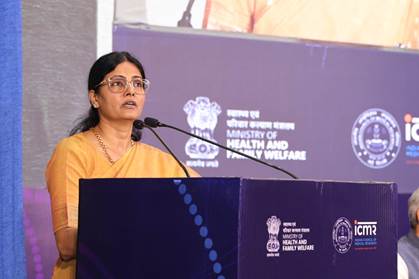
The Union Minister emphasized the Government’s commitment to ensuring that the benefits of science and research reach people at all levels. “India is becoming increasingly self-reliant in the MedTech and biomedical innovation sectors. The country is not only innovating but also demonstrating the capacity to deliver solutions at scale,” she added.
Smt. Patel further noted that evidence-based policymaking remains a guiding principle of the Government. She stressed that clinical guidelines and quality standards must be accessible to all healthcare professionals to ensure affordable and equitable healthcare for every citizen.
Highlighting the success achieved in intramural, extramural, and clinical research, the Union Minister observed that India’s health system stands at a defining moment. She encouraged the scientific community to lead the advancement of futuristic technologies such as AI-driven precision healthcare and advanced genomics. Concluding her address, she congratulated all researchers and awardees, remarking, “India should not only contribute to global science but lead it.”
In his address, Dr. V K Paul stated that the Viksit Bharat vision for ICMR is to raise the healthy life expectancy above 75 years by deploying innovative interventions, solutions, and advanced technologies.
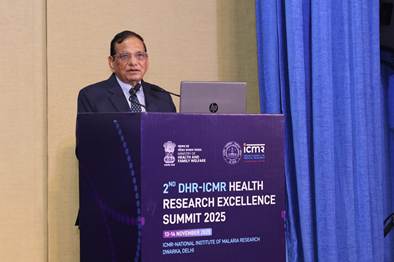
Dr. Paul urged the Department of Health Research (DHR) to focus on priority areas such as non-communicable diseases (NCDs), hypertension, and trauma care. He outlined ten key enablers to achieve this vision:
- Positioning ICMR, aided by DHR and the Government of India, among the top three health research institutions globally.
- Elevating intramural ICMR institutions to global leadership in their respective domains.
- Nurturing the world’s largest extramural research system.
- Achieving Atmanirbharta in knowledge, interventions, products, and technologies.
- Building strong linkages with state health systems.
- Strengthening primary healthcare through 1.8 lakh fully functional Ayushman Arogya Mandirs (AAMs) offering comprehensive packages for cancer, hypertension, oral health, and more.
- Promoting awareness of India’s traditional systems of medicine.
- Developing a world-class health research workforce.
- Leveraging frontier technologies such as AI and robotics for innovative health solutions.
- Developing comprehensive health strategies to counter biosecurity threats, including future pandemics.
Dr. Paul commended the DHR and ICMR teams, along with all awardees and shortlisted candidates, for their dedication to advancing India’s healthcare and research landscape.
On the occasion, several key DHR-ICMR initiatives were launched by the dignitaries:
- MedTech Mitra’s Innovator’s Guidebook for In-vitro Diagnostic (IVD) Medical Devices
- Transfer of 11 new technologies to 3 companies
- Unveiling of revamped and improved Standard Treatment Workflows
- Assistive Technologies Guidelines and Kit, including:
- An Assessment Kit for evaluation of Upper Limb functions developed by the Centre of Advanced Research & Excellence – Disability & Assistive Technology (CARE-DAT) at IIT Delhi and AIIMS Delhi
- Standards of the National List of Essential Assistive Products (NLEAP), jointly developed by ICMR and the Bureau of Indian Standards (BIS)
- Launch of the ICMR Pensioners’ Portal
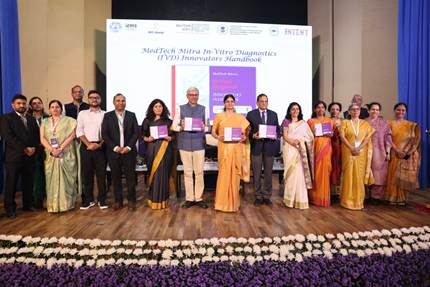
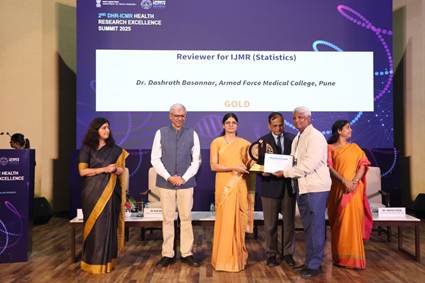
The event was attended by Dr. Rajiv Bahl, Secretary, DHR and Director General, ICMR; Smt. Anu Nagar, Joint Secretary, DHR; Smt. Manisha Saxena, Senior DDG (Administration), ICMR and senior officials from the Union Health Ministry.
Background:
- MedTech Mitra's Innovators Guidebook for In-vitro Diagnostics Medical Device (IVD)
This Innovator guidebook developed jointly by ICMR and CDSCO provides a structured pathway to help innovators understand and plan their Performance evaluation using clinical sample strategies effectively. By mapping key milestones and expectations across the innovation lifecycle, the guidebook enables researchers to anticipate requirements, align with regulatory and ethical norms, and generate robust clinical evidence to support their product`s safety and efficacy.
2. New technologies to be transferred:
|
Sl..No
|
Name of the technology
|
Developed at
|
Brief Description of the Technology
|
|
1
|
RT-LAMP Assay for detection of Nipah virus
|
ICMR-National Institute of Virology
|
Indigenously developed loop mediated isothermal amplification (LAMP) assayspecifically detects two genes of Nipah virus (N and M gene). The results are interpreted visually byobserving the color change. Sophisticated reading instrument not needed
|
|
2
|
RT-LAMP Assay for detection of Monkeypox virus
|
ICMR-National Institute of Virology
|
This assay can be used for diagnosis of Monkeypox, where quantitative detection is not necessary. The assay specifically detects two genes of Monkeypox virus (genus specific B6R gene and species specific F3L gene)
|
|
3
|
RT-LAMP Assay for detection of SARS-CoV-2
|
ICMR-National Institute of Virology
|
A rapid SARS-CoV-2 detection assay using LAMP targets the E and N genes, operating at 65 ± 10°C without a thermal cycler. Results are visually interpretable within 40 minutes, requiring minimal equipment and technical expertise.
|
|
4
|
Anti-Measles lgM ELISA
|
ICMR-National Institute of Virology
|
This ELISA uses the inactivated Measles antigen & will provide a qualitative determination of Measles specific IgM in human serum. Which can be used for early diagnosis of measles.
|
|
5
|
Japanese Encephalitis (JE) Antigen capture ELISA
|
ICMR-National Institute of Virology
|
IgM antibodies in the patient’s serum/ CSF (if present) and IgM from Positive Control are captured by anti-human IgM (µ chain specific) coated on to the solid surface (wells). In the next step, JE antigen (inactivated JE virus) is added which binds to captured human JE specific IgM Intended Use: Japanese Encephalitis (JE) IgM capture ELISA developed by ICMR-NIV is intended for qualitative determination of JE virus specific IgM antibodies in serum/ CSF of patients presenting clinical signs and symptoms consistent with JE.
|
|
6
|
Single Tube Multiplex RT-PCR for simultaneous detection of SARS-CoV2, Influenza A and B
|
ICMR-National Institute of Virology
|
TaqMan based Real Time PCR, Single tube multi virus detection assay (Four plex) Intended Use: Accurate detection of SARS CoV 2 and its variants ( Till date XFG), along with influenza A subtypes H1N1/pdm09 and H3N2, as well as influenza B lineages Yamagata and Victoria
|
|
7
|
Single tube multiplex RT-PCR for detection of SARS-CoV-2 from respiratory samples
|
ICMR-National Institute of Virology
|
Single tube multiplex RT PCR assay for detection of SARS CoV -2 from human respiratory samples. Validated by 10 VRDL/Government laboratories using 75 SARS CoV-2 positive including low medium and high CT values and 85 SARS CoV-2 negative samples.
|
|
8
|
CRISPR-based Molecular Diagnostic Kits for detection of Mycobacterium tuberculosis
|
ICMR-National Institute for Research in Tuberculosis (NIRT)
|
This CRISPR-Cas13a diagnostic targets the rpoB gene of Mycobacterium tuberculosis, using guide RNA and a fluorescent ssRNA reporter for rapid, visual detection. The tool enables sensitive MTB identification without complex instrumentation, marking a first-of-its-kind development in India.
|
|
9
|
Detection of Mycobacterium tuberculosis-derived
circulating cell-free DNA (ccfDNA) in
plasma for early TB diagnosis
|
ICMR-National Institute for Research in Tuberculosis (NIRT)
|
Optimized dual target droplet digital PCR assay Early diagnosis of Extrapulmonary TB, Asymptomatic/subclinical TB, Symptomatic clinically diagnosed/possible TB, Individuals at high risk of developing TB
|
|
10
|
Anti-KFD Human IgM ELISA
|
ICMR-National Institute of Virology
|
The assay is based on capturing the IgM antibodies on a microtiter plate using anti-human-IgM antibody. Unbound material will be removed by washing. Formation of anti-IgM antibodies complex would be detected using KFD antigen, anti KFD biotinylated IgG and Avidin Horseradish peroxidise (AV-HRP) system
|
|
11
|
Single-tube multiplex real-time RT-PCR method for simultaneous detection of Dengue, Chikungunya and Zika virus
|
ICMR-National Institute of Virology
|
Customized primers and probes with actin control to ensure RNA integrity and precise amplification. Optimized multiplex setup enables rapid, sensitive detection of co-circulating arboviruses with minimal reagent usage
|
3. Assistive Technologies Guidelines and Kit
a) The Action Research Arm Test (ARAT) Kit
The Indian Council of Medical Research (ICMR) through its Centre for Advanced Research & Excellence in Disability and Assistive Technology (CARE-DAT) has developed the Research Arm Test (ARAT) Kit, a significant advancement in the field of rehabilitation and assistive technology. The launch of this indigenously developed ARAT Kit marks a major step toward strengthening evidence-based rehabilitation practices and enhancing clinical assessment capabilities across India.
The ARAT is a well-established, standardized clinical assessment tool designed to evaluate upper limb function—specifically the arm and hand—in individuals who have experienced neurological impairments or conditions such as stroke, brain injury, or spinal cord injury. Administered typically by physiotherapists and occupational therapists, the ARAT serves as a reliable measure of a patient’s ability to perform functional tasks involving grasp, grip, pinch, and gross arm movement—core components of daily living and independence.
By providing an objective and systematic method for assessing upper extremity function, the ARAT enables rehabilitation professionals to:
- Establish baselines for each patient’s functional capacity.
- Set realistic therapeutic goals and monitor progress over time.
- Design individualized rehabilitation programs focusing on impaired muscle groups and movement patterns.
- Communicate patient progress and limitations effectively with multidisciplinary teams to ensure a comprehensive, coordinated rehabilitation approach.
The beneficiaries of the ARAT Kit include:
- Physiotherapists – to evaluate and enhance motor recovery and strength.
- Occupational Therapists – to identify limitations in daily activities and tailor functional training.
- Rehabilitation Clinics and Hospitals – to integrate standardized outcome measures into patient management and documentation systems.
Benefits of the Low-Cost ARAT Kit
In its international form, the ARAT is priced at approximately USD 750, making it inaccessible to many rehabilitation centers, particularly in low- and middle-income settings. The low-cost indigenously developed ARAT Kit by ICMR and IIT Delhi addresses this critical affordability gap, ensuring wider accessibility and equity in rehabilitation services across the country.
Key benefits include:
- Wider Accessibility: Enables widespread use of standardized assessments across physiotherapy and occupational therapy centers, including district-level and rural rehabilitation units.
- Reduced Healthcare Costs: Promotes cost-effective, high-quality care by integrating a validated functional assessment tool into routine rehabilitation.
- Support for Tele-rehabilitation: The kit’s simplicity and affordability make it adaptable for remote and home-based rehabilitation assessments, thereby extending the reach of rehabilitation services.
Expected Impact
The launch of this Low-Cost Research Arm Test (ARAT) Kit aligns with India’s vision of “Atmanirbhar Bharat” and the goal of ensuring accessible, affordable, and quality rehabilitation for all. By empowering rehabilitation professionals with reliable, evidence-based tools, this initiative will:
- Enhance clinical outcomes for patients with upper limb impairments.
- Strengthen research and data-driven decision-making in rehabilitation sciences.
- Build capacity among physiotherapists, occupational therapists, and rehabilitation institutions.
The ARAT Kit represents a transformative step in making standardized functional assessments available to every rehabilitation center in India—ensuring that recovery, independence, and dignity become achievable goals for all individuals with physical impairments.
b) Standards for National List of Essential Assistive Products (NLEAP) developed by ICMR-BIS
Assistive products are fundamental in enhancing functional independence, mobility, communication, and overall quality of life for individuals with functional impairments and older persons. Therefore, the establishment and adherence to robust national standards for 21 products included in the National List of Essential Assistive Products (NLEAP) constitute a critical national priority. Standardization across design, manufacturing, testing, and service delivery is essential to ensuring quality, safety, and equitable access for all users.
The Indian Council of Medical Research (ICMR), in collaboration with the Bureau of Indian Standards (BIS), has successfully developed the comprehensive national standards for all products listed under NLEAP. This joint effort was specifically aimed at harmonizing Indian standards with global benchmarks (including ISO and WHO-APlist frameworks), thereby ensuring that assistive products developed, validated, and deployed within India adhere to consistent quality and performance parameters.
This collaboration further strengthens the ecosystem for clinical validation, regulatory approval, and large-scale public procurement, enabling India to establish a robust, evidence-based framework for assistive technology provisioning and innovation.
Adopting and implementing these ICMR–BIS-supported robust standards is crucial to realizing India’s vision of “Access to Assistive Technology for All.” The launch is significant for the following reasons:
|
Importance
|
Detail
|
|
1. Ensuring Safety and Efficacy
|
Standards establish clear benchmarks for product performance, safety, and reliability, minimizing harm and ensuring products meet essential clinical and user requirements.
|
|
2. Facilitating Clinical Validation and Regulation
|
Defined standards enable systematic evaluation and clinical validation of products, fostering trust among clinicians, users, and policymakers prior to public health program inclusion.
|
|
3. Supporting Indigenous Manufacturing and Innovation
|
Alignment with international norms encourages local industries and start-ups to design and manufacture globally competitive assistive products that meet critical domestic needs.
|
|
4. Promoting Accessibility and Affordability
|
Standardized specifications allow for scalable production and procurement under public health systems, ensuring cost-effectiveness and uniform quality across all regions.
|
|
5. Enabling Policy and Procurement
|
Clear technical standards provide the necessary foundation for evidence-based decision-making in public procurement, insurance coverage, and inclusion under government benefit schemes.
|
The formal launch of the ICMR-BIS developed NLEAP Standards is imperative to safeguard user well-being and to decisively strengthen India’s ecosystem for innovation, manufacturing, and equitable distribution of assistive technologies. Your Ministry’s approval for the immediate launch is earnestly sought to institutionalize this framework across the nation.
- Unveiling revamped and improved Standard Treatment Workflows
To empower the primary, secondary and tertiary care physicians/ surgeons towards achieving the overall goal of Universal Health Coverage with disease management protocols and pre-defined referral mechanisms by decoding complex guidelines.
Primary Objective: To formulate clinical decision making protocols for common and serious medical/ surgical conditions for both OPD and IPD management at primary, secondary and tertiary levels of healthcare system for equitable access and delivery of health services which are locally contextual
Secondary Objective: To facilitate PMJAY arm of Ayushman Bharat with secondary and tertiary level management of all surgical and medical conditions covered under the scheme
ICMR has developed the revamped Standard Treatment Workflows (STW) website and mobile application, providing a modern, intuitive, and easily accessible platform for clinicians. The enhanced digital interface ensures quick access to evidence-based treatment workflows, supports informed clinical decisions, and strengthens the delivery of standardized care across all levels of the health system.
- Portal for ICMR Pensioners
Portal for ICMR Pensioners (https://pensioners.icmr.org.in/) developed by ICMR is ready for launch. The portal is intended to benefit ICMR pensioners as one stop solution for their pension related transactions. It has detailed provisions for the pensioners common requirements such as dependent details, pension slips, grievance addressal mechanisms for the pension, CGHS, medical bills etc. Now option for Online Life Certificate through Jeevan Pramaan (https://jeevanpramaan.gov.in/v1.0/) is also activated.
***
HFW/MoS DHR-ICMR Summit/13Nov2025/2
(रिलीज़ आईडी: 2189667)
आगंतुक पटल : 1115